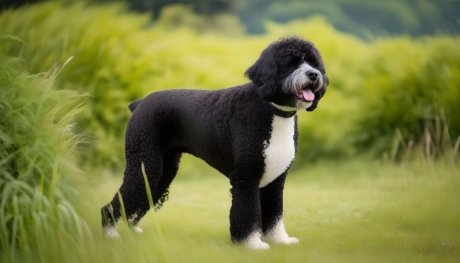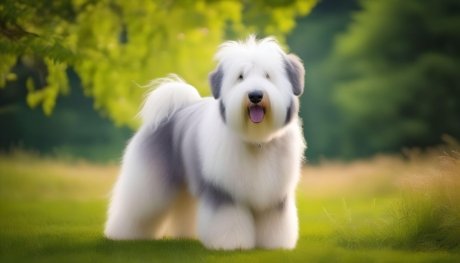St Bernard Vs Bernese Mountain Dog: A Comparison of Two Popular Breeds
When it comes to choosing a furry companion, many dog lovers find themselves torn between different breeds. Two such breeds that often capture the hearts of dog enthusiasts are the St Bernard and the Bernese Mountain Dog. Both of these magnificent breeds possess their own unique characteristics and charm. In this article, we will delve into the distinctive features of each breed, their histories, temperaments, physical attributes, and more, to help you decide which breed might be the perfect fit for you and your family.
St Bernard Vs Bernese Mountain Dog
Key differences between St. Bernards and Bernese Mountain Dogs:
| Comparison Factors | St. Bernard | Bernese Mountain Dog |
|---|---|---|
| Origin | Switzerland | Switzerland |
| Size | Very large | Large to extra-large |
| Coat Type | Long, thick | Long, thick |
| Coat Colors | Various, commonly white and red | Tricolor: black, white, and rust/brown |
| Temperament | Gentle, friendly | Affectionate, good-natured |
| Trainability | Moderately trainable | Moderately trainable |
| Activity Level | Moderate to low | Moderate |
| Grooming Needs | High | Moderate |
| Health Concerns | Hip and elbow dysplasia, heart conditions | Hip and elbow dysplasia, cancer |
| Suitability for Families | Excellent family dogs | Excellent family dogs |
| Compatibility with Other Pets | Generally good | Generally good |
| Guarding Abilities | Not typically guard dogs | Alert, may bark at strangers |
| Adaptability to Climate | Tolerates cold weather well | Tolerates cold weather well |
| Popularity | Popular | Popular |
| Average Price Range (India) | ₹50,000 – ₹1,50,000 | ₹80,000 – ₹2,50,000 |
1. History and Origins
St. Bernard:

The St. Bernard breed traces its roots back to the Swiss Alps, where these dogs were initially bred by monks at the St. Bernard Hospice. These gentle giants were originally used for search and rescue missions in the treacherous mountains. They are known for their exceptional tracking abilities and were adept at finding lost or stranded travellers.
Bernese Mountain Dog:

The Bernese Mountain Dog, on the other hand, hails from the Swiss region of Bern. Originally bred as working dogs on farms, they were primarily utilized for herding livestock and pulling carts. These dogs were valued for their strength, endurance, and loyalty.
2. Temperament and Personality
St. Bernard:
St. Bernards are renowned for their friendly and gentle nature. They are incredibly patient, making them excellent companions, particularly for families with children. These dogs are known for their calm and relaxed demeanour, which makes them great for households seeking a laid-back and affectionate canine companion.
Bernese Mountain Dog:
Bernese Mountain Dogs are also known for their friendly and gentle personalities. They are highly sociable dogs that thrive on human interaction and love being part of a family. Their playful and outgoing nature, combined with their loyalty and protectiveness, makes them an excellent choice for those seeking an active yet affectionate pet.
3. Physical Characteristics
St. Bernard:
St. Bernards are large and robust dogs with a powerful build. They have broad heads, expressive eyes, and droopy jowls. Their thick double coats provide insulation in cold weather, and their signature feature is their adorable drooping ears. They are known for their impressive size, with adult males weighing between 140 to 180 pounds (63 to 81 kg).

Bernese Mountain Dog:
Bernese Mountain Dogs are also large, but slightly smaller than St. Bernards. They have a distinctive tri-color coat, with a combination of black, white, and rust-colored fur. These dogs have a strong and muscular build, with a broad chest and sturdy legs. They have expressive eyes and floppy ears that add to their charm.
4. Exercise and Activity Needs
St. Bernard:
Due to their large size, St. Bernards have moderate exercise requirements. They enjoy daily walks and appreciate outdoor activities, but they are not overly active dogs. Regular exercise helps keep them in good physical condition and prevents obesity, a common issue in this breed.
Bernese Mountain Dog:
Bernese Mountain Dogs are active and require regular exercise to keep them mentally and physically stimulated. They enjoy long walks, hikes, and other outdoor activities. Engaging in playtime and providing them with challenging toys can help prevent boredom and destructive behaviour.
5. Grooming and Maintenance
St. Bernard:
St. Bernards have a thick, dense double coat that requires regular grooming. Brushing their fur a few times a week helps prevent matting and keeps their coat healthy. They are moderate shedders, with heavier shedding occurring during seasonal changes. Additionally, they require routine maintenance, such as nail trimming and ear cleaning.
Bernese Mountain Dog:
Bernese Mountain Dogs also have a thick double coat that requires regular grooming. They shed moderately throughout the year, with heavier shedding during spring and fall. Frequent brushing helps keep their coat in good condition and reduces the amount of loose fur around the house. Regular maintenance, including nail trimming and dental care, is essential for their overall well-being.
6. Health Concerns
St. Bernard:
Like many large breeds, St. Bernards are prone to certain health issues. They are susceptible to hip and elbow dysplasia, which can cause mobility problems. They are also prone to bloat, a potentially life-threatening condition. Regular vet check-ups, a balanced diet, and proper exercise are crucial for maintaining their overall health.
Bernese Mountain Dog:
Bernese Mountain Dogs are also prone to specific health concerns. They have a higher risk of developing certain types of cancer, such as histiocytic sarcoma. They are also susceptible to hip and elbow dysplasia, as well as bloat. Routine veterinary care, a nutritious diet, and regular exercise can help prevent or manage these health issues.

7. Trainability and Intelligence
St. Bernard:
St. Bernards are intelligent dogs but can be somewhat stubborn and independent at times. They respond well to positive reinforcement-based training methods. Early socialization and consistent training are essential to shape their behavior and ensure they grow up to be well-mannered and obedient companions.
Bernese Mountain Dog:
Bernese Mountain Dogs are intelligent and eager to please, making them relatively easy to train. They respond well to positive reinforcement and thrive in training environments that are fun and engaging. Early socialization and consistent training are vital to mold their friendly and well-behaved nature.
8. Living Conditions and Space Requirements
St. Bernard:
Due to their large size, St. Bernards are better suited for homes with ample indoor and outdoor space. They require a comfortable living environment, preferably with access to a secure and spacious backyard. It is essential to provide them with enough room to move around comfortably.
Bernese Mountain Dog:
Bernese Mountain Dogs are also better suited for homes with sufficient space. They can adapt to living in apartments if provided with regular exercise and mental stimulation. However, a house with a fenced yard is ideal for them to roam and play freely.
9. Compatibility with Children and Other Pets
St. Bernard:
St. Bernards are renowned for their gentle and patient nature, which makes them excellent companions for children. They are tolerant of rough play and can form strong bonds with kids. They also tend to get along well with other pets, given proper socialization and introductions.
Bernese Mountain Dog:
Bernese Mountain Dogs are known for their love of family and their affinity for children. They are patient and gentle, making them excellent playmates for kids. With proper introductions and socialization, they can coexist peacefully with other pets, including cats and smaller dogs.

Choosing the Right Breed for You
Deciding between a St. Bernard and a Bernese Mountain Dog ultimately depends on your lifestyle, preferences, and commitment to providing proper care for these breeds. Consider factors such as the space you have available, the amount of exercise and grooming you can provide, and the temperament that aligns with your family dynamics. Both breeds are incredibly loving and make excellent companions; it’s a matter of personal preference.
Conclusion:
In conclusion, the St. Bernard and Bernese Mountain Dogs are two magnificent breeds that offer unique qualities to potential owners. While the St. Bernard is known for its gentle nature and impressive size, the Bernese Mountain Dog brings its own charm with a friendly and sociable personality. Whether you choose the gentle giant or the loyal working dog, both breeds will undoubtedly bring joy, love, and companionship to your life.
Frequently Asked Questions on St Bernard Vs Bernese Mountain Dog:
-
Are St. Bernards and Bernese Mountain Dogs good with children?
Yes, both breeds are known for their gentle and patient nature, making them great companions for children.
-
Do St. Bernards and Bernese Mountain Dogs get along with other pets?
With proper socialization, both breeds can coexist peacefully with other pets, including cats and smaller dogs.
-
How much exercise do St. Bernards and Bernese Mountain Dogs need?
St. Bernards have moderate exercise needs, while Bernese Mountain Dogs require regular exercise and mental stimulation.
-
Are St. Bernards and Bernese Mountain Dogs prone to any health issues?
Yes, both breeds have certain health concerns, such as hip and elbow dysplasia, and may require regular veterinary care.
-
Can St. Bernards and Bernese Mountain Dogs adapt to apartment living?
While it is possible with regular exercise, both breeds are better suited for homes with ample indoor and outdoor space.
-
What is the average lifespan of a St. Bernard or Bernese Mountain Dog?
On average, St. Bernards have a lifespan of 8 to 10 years, while Bernese Mountain Dogs typically live between 7 and 10 years.
-
Are St. Bernards and Bernese Mountain Dogs good guard dogs?
While both breeds have a protective nature, they are generally more friendly than aggressive. St. Bernards may bark to alert their owners, but they are not typically aggressive guard dogs. Bernese Mountain Dogs are also more likely to be friendly and welcoming toward strangers rather than being aggressive.
-
Are St. Bernards and Bernese Mountain Dogs suitable for first-time dog owners?
Both breeds can be suitable for first-time dog owners with proper research, training, and commitment to meeting their specific needs. It’s important to consider the size, exercise requirements, and grooming needs of these breeds before making a decision.
-
Do St. Bernards and Bernese Mountain Dogs drool a lot?
Yes, both breeds are known for their tendency to drool. St. Bernards, in particular, have large jowls that can collect and drip saliva. Regular wiping and cleaning of their mouths can help manage the drooling.
-
Are St. Bernards and Bernese Mountain Dogs prone to separation anxiety?
Both breeds can be prone to separation anxiety if not properly trained and socialized. They thrive on human companionship and can become anxious or destructive when left alone for extended periods. Early training and gradual alone-time exposure can help prevent separation anxiety.
-
How much does a St. Bernard cost?
The price of a St. Bernard can vary depending on various factors such as the breeder’s reputation, the puppy’s lineage, location, and quality. On average, you can expect to pay between $1,500 and $3,000 for a St. Bernard from a reputable breeder.
-
How much does a St. Bernard cost in India?
The price of a St. Bernard in India can vary depending on various factors such as the breeder’s reputation, the puppy’s lineage, location, and quality. On average, you can expect to pay between ₹40,000 and ₹80,000 for a St. Bernard from a reputable breeder in India.
-
What factors influence the price of a Bernese Mountain Dog in India?
The price of a Bernese Mountain Dog in India is influenced by factors like the breeder’s reputation, the lineage and pedigree of the puppy, the location, and the demand for the breed. Generally, a Bernese Mountain Dog from a reputable breeder in India can cost between ₹60,000 and ₹1,20,000.
Recommended related to St Bernard Vs Bernese Mountain Dog:
American Bully Vs Pitbull (2023) | Differences and Similarities
Cane Corso Vs Pitbull: A Comparison of Two Popular Dog Breeds





























